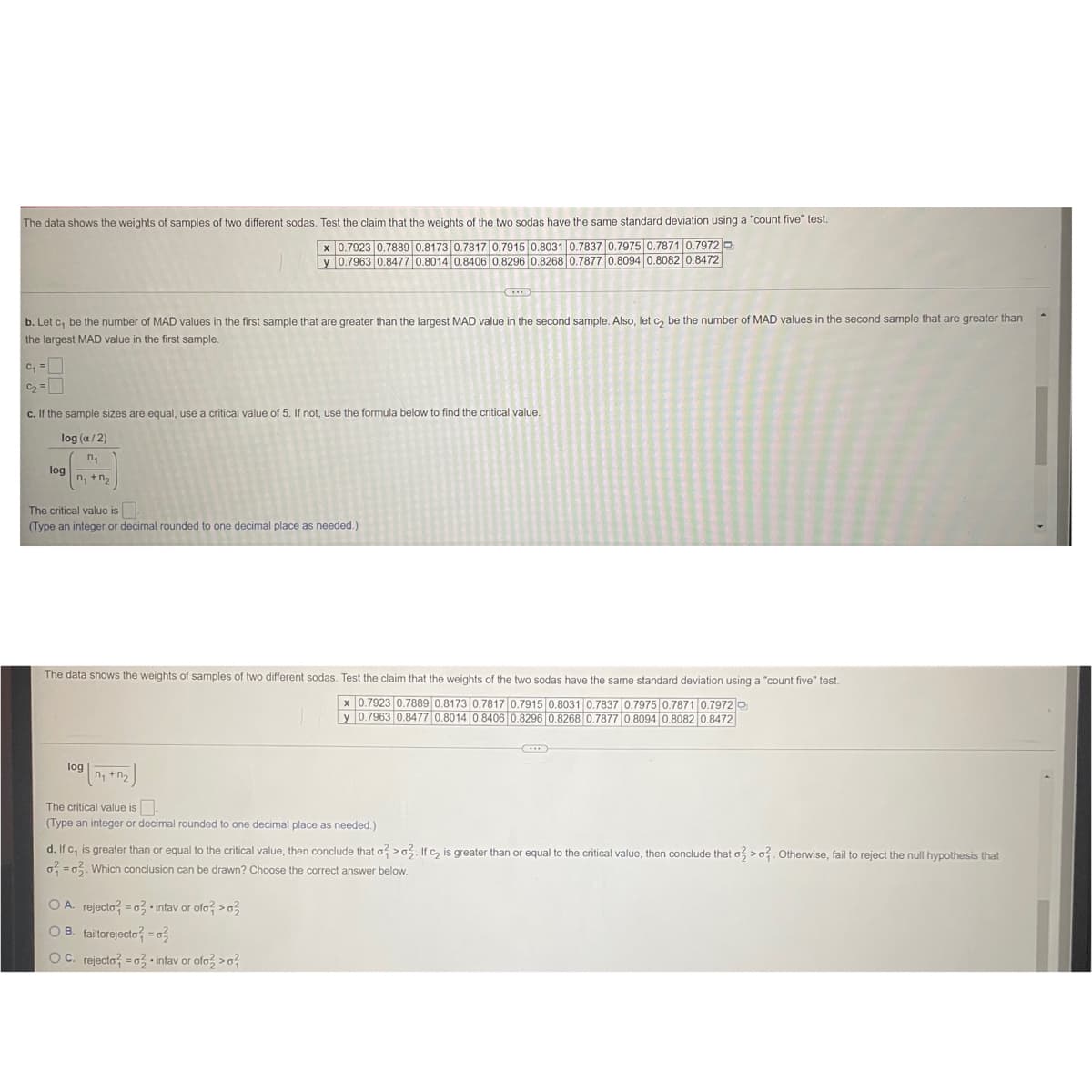The data shows the weights of samples of two different sodas. Test the claim that the weights of the two sodas have the same standard deviation using a "count five" test. x 0.7923 0.7889 0.8173 0.7817 0.7915 0.8031 0.7837 0.7975 0.7871 0.7972 y 0.7963 0.8477 0.8014 0.8406 0.8296 0.8268 0.7877 0.8094 0.8082 0.8472
The data shows the weights of samples of two different sodas. Test the claim that the weights of the two sodas have the same standard deviation using a "count five" test. x 0.7923 0.7889 0.8173 0.7817 0.7915 0.8031 0.7837 0.7975 0.7871 0.7972 y 0.7963 0.8477 0.8014 0.8406 0.8296 0.8268 0.7877 0.8094 0.8082 0.8472
Glencoe Algebra 1, Student Edition, 9780079039897, 0079039898, 2018
18th Edition
ISBN:9780079039897
Author:Carter
Publisher:Carter
Chapter10: Statistics
Section10.4: Distributions Of Data
Problem 19PFA
Related questions
Question

Transcribed Image Text:The data shows the weights of samples of two different sodas. Test the claim that the weights of the two sodas have the same standard deviation using a "count five" test.
x 0.7923 0.7889 0.8173 0.7817 0.7915 0.8031 0.7837 0.7975 0.7871 0.7972 D
y 0.7963 0.84770.8014 0.8406 0.8296 0.8268 0.7877 0.8094 0.8082 0.8472
b. Let c, be the number of MAD values in the first sample that are greater than the largest MAD value in the second sample. Also, let c, be the number of MAD values in the second sample that are greater than
the largest MAD value in the first sample.
c. If the sample sizes are equal, use a critical value of 5. If not, use the formula below to find the critical value.
log (a/2)
n,
log
n, +n2
The critical value is.
(Type an integer or decimal rounded to one decimal place as needed.)
The data shows the weights of samples of two different sodas. Test the claim that the weights of the two sodas have the same standard deviation using a "count five" test.
x 0.7923 0.7889 0.8173 0.7817 0.7915 0.8031 0.7837 0.7975 0.7871 0.7972O
y 0.7963 0.8477 0.8014 0.8406 0.8296 0.8268 0.7877 0.8094 0.8082 0.8472
log
n, +n2
The critical value is.
(Type an integer or decimal rounded to one decimal place as needed.)
d. If c, is greater than or equal to the critical value, then conclude that o >o. If c, is greater than or equal to the critical value, then conclude that o >o?. Otherwise, fail to reject the null hypothesis that
o: =0. Which conclusion can be drawn? Choose the correct answer below.
OA. rejecto? = a3 • infav or ofa? >o}
O B. failtorejecto? =o}
OC. rejecta? = o? • infav or ofa >a?

Transcribed Image Text:The data shows the weights of samples of two different sodas. Test the claim that the weights of the two sodas have the same standard deviation using a "count five" test.
|x 0.7923 0.7889 0.8173 0.7817 0.7915|0.8031 0.7837 0.7975|0.7871 0.7972 -
y 0.7963 0.8477 0.8014 0.8406 0.8296 0.8268 0.7877 0.8094 0.8082 0.8472
a. For the first sample, find the mean absolute deviation (MAD) of each value. Do the same for the second sample.
Find the MAD of each x value. Recall that the MAD of the sample value is x-x.
0.7923 0.7889 0.8173 0.7817 0.7915 0.8031 0.7837 0.7975 0.7871 0.7972
MAD O O ODO
(Round to four decimal places as needed.)
Find the MAD of each y value.
0.7963 0.8477 0.8014 0.8406 0.8296 0.8268 0.7877 0.8094 0.8082 0.8472
MAD OO OOOO OOOO
(Round to four decimal places as needed.)
b. Let c, be the number of MAD values in the first sample that are greater than the largest MAD value in the second sample. Also, let c, be the number of MAD values in the second sample that are greater than
the largest MAD value in the first sample.
Expert Solution
This question has been solved!
Explore an expertly crafted, step-by-step solution for a thorough understanding of key concepts.
This is a popular solution!
Trending now
This is a popular solution!
Step by step
Solved in 2 steps

Recommended textbooks for you

Glencoe Algebra 1, Student Edition, 9780079039897…
Algebra
ISBN:
9780079039897
Author:
Carter
Publisher:
McGraw Hill

Glencoe Algebra 1, Student Edition, 9780079039897…
Algebra
ISBN:
9780079039897
Author:
Carter
Publisher:
McGraw Hill